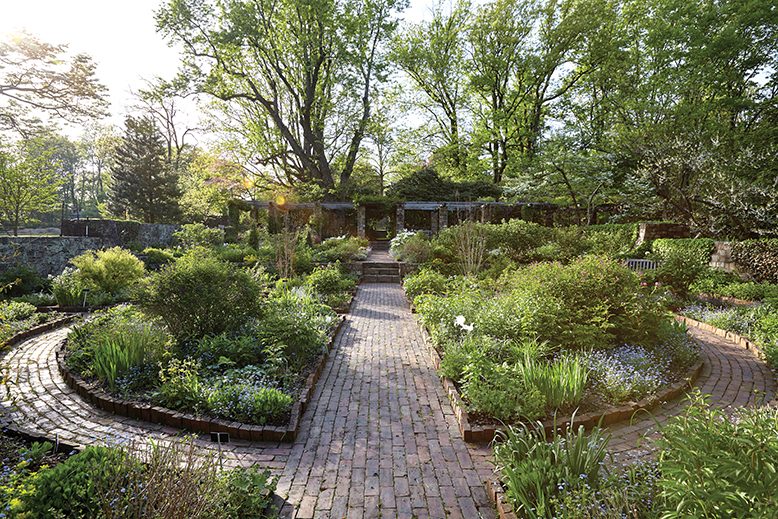
Visiting Cross Estate Gardens is like stepping back to a more formal time of grand country estates. Yet despite its prim-and-proper vibe, Cross Estate is open to the public, dogs are welcome, and visitors are encouraged to meander and enjoy the gardens—which are indeed formal.
The noted civil engineer John Bensel built the original estate, Queen Anne Farm, in 1905 as a summer cottage for his family. The stately 23-room mansion, on 300 rolling acres in Bernardsville, overlooks the headwaters of the Passaic River. Also on the sprawling property: a carriage house, a smaller gatehouse, and a majestic, five-story stone tower that once fed well water into the mansion.
Several years after Bensel’s death in 1922, his widow, Ella, sold the estate to W. Redmond Cross, a New York investment banker who renamed the property Hardscrabble House. Cross’s wife, Julia Newbold Cross, a member of the Royal Horticultural Society, worked tirelessly to restore the mansion and the grounds. With renowned landscape architect Clarence Fowler, she designed a formal, English-style garden with an unusual assortment of plants and flowers. “Julia was the real mastermind behind the gardens,” says Joan Ryder, president of the New Jersey Historical Garden Foundation, the volunteer group that maintains and raises funds for the park.

Historic Cross Estate Gardens features a walled garden with several hundred different sun-loving perennials, a stone-columned pergola and, in the background, magnificent 18-foot-tall native rhododendrons. Photos by Laura Moss
Redmond and Julia raised their five children on the estate and employed a large staff to maintain the gardens. “They didn’t have a lot of inside help, but a lot of outside help,” explains Ryder.
After both were gone—Redmond died in 1940 and Julia in 1972—their grown children sold 162 acres of the property to the Morristown National Historical Park, including the primary buildings. The acquisition was key to providing protection for the adjacent 18th-century New Jersey Brigade Revolutionary War encampment area and became a preservation corridor for Jockey Hollow, the centerpiece of the Morristown National Historical Park. Several hiking trails connect Cross Estate to Jockey Hollow, Lewis Morris Park and the Scherman-Hoffman Wildlife Sanctuary.
Unfortunately, only limited federal funds were allocated for maintenance, and none for the gardens. In time, the estate fell into disrepair. Enter Chester resident Jean Pope, who in 1977 began a volunteer brigade to bring the gardens back to life.
“Back in 1977, there was no deer fencing. Everything had been left untended,” says Ryder. “But the bones of the garden were there. Jean Pope, along with her friends, started weeding to show off the existing structures.”

Spring flowers include Siberian iris Caesar’s Brother and clematis Henryi. Photo by Laura Moss
Pope and her volunteers discovered and refurbished several distinct garden areas: a two-tiered, walled, sunken garden; an expansive allée of mountain laurels; a lawn garden with native primroses, rhododendrons and other perennials; and the most popular attraction, a spectacular, 200-foot-long, wisteria-covered pergola.
 “A lot of what you’re seeing today on the outside is the imagination of Julia Newbold Cross,” says Jude Pfister, chief of cultural resources for the Morristown National Historical Park. “She was an expert—that’s not too strong of a word.”
“A lot of what you’re seeing today on the outside is the imagination of Julia Newbold Cross,” says Jude Pfister, chief of cultural resources for the Morristown National Historical Park. “She was an expert—that’s not too strong of a word.”
The mansion also remains, but in an altered state. After Redmond’s death, Julia hired architect Frederic King to downsize the home to reduce expenses. King removed the entire east wing and several terraces. “I enjoy trying to envision what that house originally looked like,” says Pfister. “This is one of the few intact estates from that time period that is open to the public.”
Thankfully, the water tower remains intact and still supplies water. “The view from there, overlooking Somerset Hills, is gorgeous,” says Ryder.
A dedicated group of about 30 volunteers still maintains the gardens. “We start in late March or very early April,” says Ryder. “Not everyone is a skilled gardener,” she says. “We do it out of love.”
The group meets every Wednesday from 9 am-noon, with a mid-morning break to enjoy baked goods and chitchat, says Ryder. “We’re all very good friends.”
About 2,000 visitors come year-round to enjoy the flora. A self-guided tour allows guests to explore at their own pace, wandering through historic trees, including rare silver maples and dawn redwoods. There’s something new to see every month, says Ryder. “It’s a riot of color at the end of May.”
Cross Estate Gardens is a project of the New Jersey Historical Garden Foundation in cooperation with the National Park Service. It is open from 8 am–dusk year-round. Admission and parking are free. Tours are available 10-11:30 am Wednesdays from mid-April through October. Call 201-240-5898 for reservations or visit crossestategardens.org.



